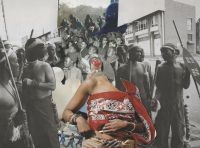
Title: KuBhubhʼuMhlaba (2022)
Marikana was one of the most grotesque post-apartheid acts of state violence exhibited live on international television. This event both drove public disillusion with democracy as a tool for economic freedom and prophesied a future of wanton loss of life connected somehow to the nature of state administration. Here, thinking of Phoenix. [1]
“Remembering the life of Johnny Clegg” "the white Zulu" standing with Amaqhawe[2]:
Jacob Zuma is not a poor man of course (but what is a rich black politician according to Malema in that Debora Patta interview? She asks “who are you?” Malema says, “an aspiring communist, a child of a working class.” Debora says “but you are no longer a working class.” Malema says “my being, my loyalty, my existence is informed by background.” Deborah says “surely that contradicts your lifestyle.” Malema says “no, there's nothing I have because I am still alienated from the means of production”). Maybe Zuma is not rich in the sense that his background as an impoverished boy with no formal education remains a sceptre in his political participation. Maybe this is affirmed more by the attachment of his Nkandla home for failing to pay his VBS loan, i.e he is not rich enough even to keep his home. Kind of reminds me of Kanye's “you don't have the answers Sway”. But even if he was rich, what is the relationship between Zuma and the poor of KwaZulu-Natal? He enjoys traditional reverence that is beyond the hierarchies of the state.
Something W.E.B. Du Bois says about double consciousness in The Souls of Black folk, demonstrated by Peter Ekeh in Colonialism and The Two Publics in Africa, i.e the state is engaged with as far as it is useful and generally abhorred for its violence. This is to say Zuma leads on both sides of the veil and maintains resonance beyond the reach of colonialism. This image which for me asserts the identity and power of the Zulu represents this nuanced aspect of the violence and looting in Durban. The idea is that while Zuma was ejected from the hierarchies of state control, he still has influence with the heart of Zulu people who might view his leadership as something more than maintaining the wheels of a capitalist political economy. Perhaps in the ranking of the King? And yet, by his participation in the ANC, Zuma has colluded with capital to the maintenance of poverty in South Africa, including KZN. This for me is an enclave for a polarizing paradox - the man who destabilized a country is the subject for which the violence in the Durban protests was staged. Perhaps that's why Clegg is here, face concealed by an unknown warrior, but body still present in the collage. I don't mean to place the burden of whiteness on this well-meaning white man, but merely to consider him symbolically, which is maybe why his face is masked.
The base of the collage is layered by an image by Shaul Schwarz of looting in Haiti, to express the universality sometimes of struggles and connect the suffering of KZN with the suffering of other places in the world experiencing similar contours of injustice. Growing up in Lesotho, the most memorable political riots had in them the element of destruction against economic strongholds, and right or wrong, this is a popular tool of registering injustice, not just in KZN, not just in Durban but in the World, and that provides an emphatic point to which the discussion about the place of human dignity and economic, or rather capitalist success.
[1] Miners Shot Down (2014); Cutting Edge, Scars of Phoenix (21 Septemeber 2021).
[2] Art Africa (July 2019).
[3] Deborah Patta and Malema Unplugged - Part 1 (26 May 2010).